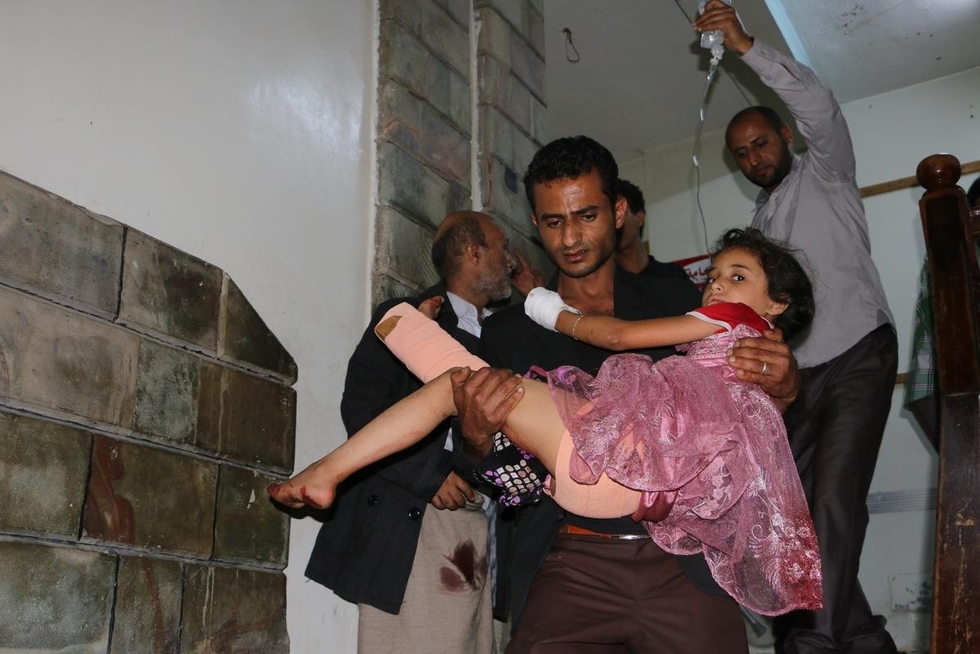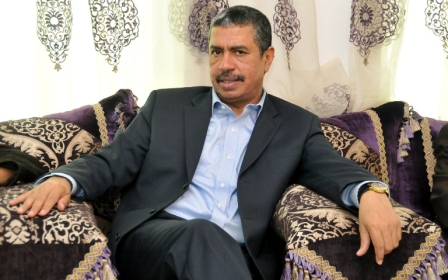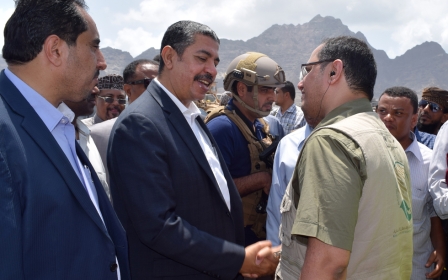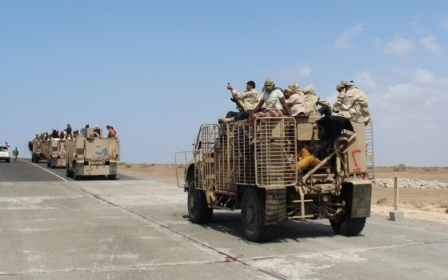Houthis open new fronts in Yemen's Taiz

Yemen's Houthi militia and allied forces have attacked a number of areas in Taiz province, after suffering a major setback when they lost control of the strategic Bab al-Mandab strait to government loyalist forces backed by the Saudi-led coalition on Tuesday.
The coalition had also helped local forces known as the Popular Resistance in Taiz to re-capture the island of Perim (Mayyun in Arabic), situated between the Gulf of Aden and the Red Sea, from militia control.
The Houthis, however, backed by forces loyal to former president Ali Abdullah Saleh, have opened several new fronts in the province, mostly in areas near Bab al-Mandab strait like Mocha, al-Wazeya and Dhubab.
The strait, through which the US Energy Information Administration says 3.8 million barrels of oil passed through in 2013, had been in the hands of the Houthis and their allies since March.
Mohammed Abdulsallam, a spokesperson for the Houthis, told Middle East Eye that his fighters withdrew from the strait because they wanted to avoid clashes in the area due to international maritime navigation.
New MEE newsletter: Jerusalem Dispatch
Sign up to get the latest insights and analysis on Israel-Palestine, alongside Turkey Unpacked and other MEE newsletters
Abdulsallam stressed that the Houthis would keep fighting the "invaders" in the whole country of Yemen, in a reference to the Saudi-led coalition supporting President Abedrabbuh Mansour Hadi and Prime Minister Khaled Bahah following the rebel militia's seizure of the capital Sanaa in September 2014.
Abdulsallam also said that the Houthis would protect Yemen from Islamic State (IS) militants and members of al-Qaeda in the Arabian Peninsula (AQAP).
Next destination, Mocha
Houthi militiamen retreating from Bab al-Mandab had moved into the port city of Mocha, which lies some 20 km north of the strait.
However, Yemeni government spokesperson Rageh Badi told Middle East Eye that pro-government forces had been shelling Houthi positions in Mocha and Dhubab for three days, ahead of a plan to clear the areas of militia presence.
"The next step of the coalition forces will be evacuating Mocha from the Houthi rebels, as this area is the nearest one to Bab al-Mandab, and then the forces will go towards the other areas in Taiz," Badi told MEE.
According to Badi, coalition forces will eventually participate in evacuating the whole of Taiz province of the Houthi militia, adding that the reason for starting from Bab al-Mandab is a military preference to come through the sea.
"Taiz is in the hearts of the all Yemeni officials, and we appreciate the efforts of Taiz' residents, so I want to tell them to make sure that the victory of Taiz will be soon," said Badi.
On Saturday, Yemen's premier vowed to press on with the military campaign to retake the territory from the Houthis.
Coalition forces reached Taiz more than five months after the Houthis attacked the province - which had forced most of its civilians to leave the city of Taiz towards rural areas.
Military reinforcements
Following the Houthi offensive on al-Wazeya, Mocha and Dhubab, the local fighters of Taiz received military reinforcement from Aden.
The spokesperson of the Popular Resistance in Taiz, Rashad al-Sharabi, told MEE that following the capture of Bab al-Mandab from the Houthis, military reinforcement arrived in the province for the first time.
"The coalition forces already provided the members of the Popular Resistance with the weapons, and some of them have joined the war in different areas in Taiz such as al-Wazeya and Karesh, and others joined the war inside the city, while others are waiting to accompany the coalition ground forces in freeing Dhubab and Mocha," al-Sharabi said.
Reinforcement from pro-government forces and the airstrikes by the coalition prevented the Houthis from making new advances in the area.
Al-Sharabi accused the Houthis of continuing to target civilian homes, saying eight civilians were killed by militia shelling in al-Wazeya on Saturday while others were injured.
"We can say that the decisive war of Taiz province started last Thursday, even if the Houthis have imposed a siege on the province four weeks ago from different directions, but there are huge military reinforcements that will help break the siege of the Houthis," al-Sharabi added.
The Houthis are fighting fiercely in al-Wazeya district to take over the coastline road that connects Taiz with Lahj and Aden provinces, where the reinforcements to Taiz are coming through. However they have not yet been able to take it over, according to al-Sharabi.
"The Popular Resistance was able to fight the Houthis using normal weapons, when the number of (Popular Resistance) fighters did not exceed 4,000," said al-Sharabi, adding that they now number 35,000.
Al-Sharabi said that when the Houthis failed to advance in the city, they resorted to fighting on the coastline to claim control of new areas in Taiz.
Pessimism
There are, however, people who believe that coalition forces will not join the fight in and around Taiz city.
Mohammed al-Hasani, Yemeni analyst and former managing editor of al-Tagheer news website, believes that coalition forces will remain in the Bab al-Mandab, Mocha and Dhubab areas.
"The coalition forces want to save the international maritime navigation, and they do not care about evacuating the province of the Houthis, so they may support the Popular Resistance with weapons, but they will not participate in fighting inside the city," al-Hasani told MEE.
He said that only the residents of Taiz could capture their province from the Houthis, adding that they should not rely on the coalition forces to do that for them.
However, pro-Houthi residents of Taiz are unlikely to leave the province without a fight.
Zuhair Ali, a Houthi supporter from al-Shimayateen district in Taiz told MEE that the militia would not leave the province, saying that the coalition forces could not fight them inside Taiz city.
"During the last five months the Popular Resistance could not retake a single area inside Taiz city," said Ali. "The Houthis did not prefer to fight in the (Bab al-Mandab) strait, but the Houthis will not leave the city of Taiz."
In the meantime, however, thousands of people who were displaced by the Houthi advance on Taiz are waiting for the war to stop so that they can return to their homes in the city.
Middle East Eye delivers independent and unrivalled coverage and analysis of the Middle East, North Africa and beyond. To learn more about republishing this content and the associated fees, please fill out this form. More about MEE can be found here.




